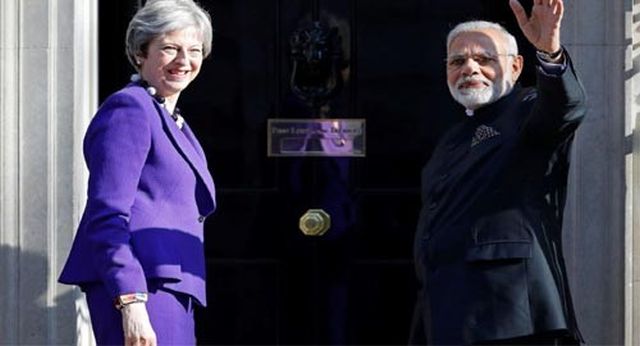
by admin | May 25, 2021 | Employment, Overseas, World
 Manila : Philippines President Rodrigo Duterte has announced that a ban on Filipinos working in Kuwait will be made permanent and he urged those still working in that country to return home, state media reported on Sunday.
Manila : Philippines President Rodrigo Duterte has announced that a ban on Filipinos working in Kuwait will be made permanent and he urged those still working in that country to return home, state media reported on Sunday.
Duterte made the comments during a speech on Saturday in Singapore on the sidelines of the 32nd ASEAN Summit, Efe news reported.
“Those who are there in Kuwait… I now appeal for your sense of patriotism. Come home,” Duterte said.
Duterte in February issued a temporary ban on sending additional workers to Kuwait pending an investigation into the murder of a 29-year-old Filipino house worker, whose body was found in the freezer of her employers. They have been sentenced to death for the murder.
The case sparked outrage in the Philippines and has triggered a diplomatic crisis as thousands of domestic workers left the Gulf nation.
The Philippine Ambassador in Kuwait, Renato Villa, has also been recalled.
The two nations are due to sign a MoU on the protection of overseas Filipino workers in June.
—IANS

by admin | May 25, 2021 | Business, Corporate, Corporate Buzz, Corporate Governance, Emerging Businesses, Employment, Investing, News, Politics
 New Delhi : The new UK-India Tech Partnership agreed to during the bilateral meeting between visiting Indian Prime Minister Narendra Modi and his British counterpart Theresa May will help generate significant investment and create jobs, the British High Commission here said.
New Delhi : The new UK-India Tech Partnership agreed to during the bilateral meeting between visiting Indian Prime Minister Narendra Modi and his British counterpart Theresa May will help generate significant investment and create jobs, the British High Commission here said.
“An ambitious new UK-India Tech Partnership is expected to generate significant investment and support the creation of thousands of new jobs across the UK,” the High Commission said in a statement.
It said under the Partnership, Britain will establish a new UK-India Tech Partnership to identify and pair businesses, venture capital, universities and others to provide access routes to markets for British and Indian entrepreneurs and small and medium enterprises.
“It follows on from the success of the UK-Israel Tech Hub which has generated £62 million worth of deals over the past five years, with a potential impact of 600 million pounds for the UK economy,” it stated.
“The most up-to-date figures show the UK exported 358 million pounds of digital services to India in 2015.”
According to the statement, based on these figures, the success of the UK-Israel Tech Hub and the size of the Indian economy, Britain believes this initiative could give its economy a significant boost.
It said the UK-India Tech Partnership is expected to contribute to an increase of thousands of tech jobs in the UK in the coming years.
“Our world-leading digital economy is booming, worth more than 116 billion pounds a year and employing more than two million people,” British Digital Secretary Matt Hancock said in the statement.
“We’re determined to see this incredible success continue, and this ambitious UK-India Tech Partnership will bring together some of the best minds working in tech to unlock its future potential and deliver high-skilled jobs and economic growth in both countries.”
According to the High Commission statement, Britain will initially invest 1 million pounds to pilot the approach and potentially up to a further 13 million pounds by 2022.
“To build the network the government will engage in-country experts to work with the British High Commission in New Delhi, the Indian government and the private sector in order to increase tech investment, exports and research and development,” it said
It also said that smaller regional teams will link specific cities and regions in India and Britain.
“The Partnership will encourage innovation and productivity by helping businesses in the UK and India collaborate on emerging technologies, develop mentoring relationships and exchange staff,” the statement said.
“The regional teams will also ensure the impact is felt across the breadth of both nations’ expansive tech sectors, and that successful approaches adopted in one region can be shared and adopted in others.”
Initially the pilot will connect Britain with Pune in Maharashtra, focussing on the Future of Mobility, including low emission and autonomous vehicles, battery storage and vehicle light-weighting. Additional connections will be linked to Bengaluru with a focus on augmented and virtual reality, advanced materials and artificial intelligence.
If it is as successful as expected, the Partnership can be scaled up to bring in more regions of Britain and India which share expertise in the relevant fields.
In parallel, Britain and India’s tech trade associations TechUK and Nasscom will work together through a new UK-India Tech Alliance, bringing senior tech leaders together to collaborate, help develop policy and encourage innovation, according to the statement.
“This is an incredibly important partnership and something tech businesses from both countries have been driving for. The UK and India are leaders in the development and use of digital tech, and there is a huge amount we can learn from each other and big opportunities to join forces in innovation,” Julian David, CEO of techUK, said in the statement
“This is an incredibly important partnership and something tech businesses from both countries have been driving for. The UK and India are leaders in the development and use of digital tech, and there is a huge amount we can learn from each other and big opportunities to join forces in innovation,” David said.
“India is also a key strategic partner for the UK with world-class digital skills. Deepening our engagement will open up opportunities for business in both countries and help ensure we maximise the benefits of technology for our societies and citizens.”
—IANS

by admin | May 25, 2021 | Corporate Jobs, Employment, Government Jobs
 New Delhi : The Indian Railways has received over 2.12 crore applications for about one lakh jobs, an official said on Friday.
New Delhi : The Indian Railways has received over 2.12 crore applications for about one lakh jobs, an official said on Friday.
“The Railway Recruitment Board advertised for the positions last month. Since then over 2.12 crore aspirants have filed online applications from across the country,” the official told IANS.
The last date for applying for the jobs is March 31.
The railways currently employ over 13.5 lakh people and is one of the biggest government employers.
The Ministry had invited online applications for one lakh posts in Group C Level 1 (erstwhile Group D) like track maintainer, points man, helper, gateman and porter and Group C Level 2 categories like assistant loco pilots and technicians through Railway Recruitment Boards websites.
On February 19, the Ministry relaxed the upper age limit by two years for all categories.
“The railways will invite applications for over 9,100 posts in Railway Protection Force (RPF) and Railway Protection Special Force (RPSF) between May 19 and 25 this year,” the official said.
These jobs in the RPF would be mainly for the women. “Currently there are about 2,400 women RPF personnel. After the recruitment, the strength of women personnel would go up to 6,900,” the official added.
—IANS

by admin | May 25, 2021 | Corporate Jobs, Employment, Government Jobs, News, Politics, Private Jobs
 Visakhapatnam : New Jersey-based Conduent Incorporated on Thursday announced to expand its presence in India by opening a new location in Visakhapatnam that will help create 5,000 jobs in the city in the next two years.
Visakhapatnam : New Jersey-based Conduent Incorporated on Thursday announced to expand its presence in India by opening a new location in Visakhapatnam that will help create 5,000 jobs in the city in the next two years.
A global leader in digital interactions with operations in 35 countries, the Visakhapatnam site will be the company’s ninth location in the country.
“The entry of global businesses like Conduent to the city is a sign of the city’s growing stature as a business hub. It is yet another example of how investing in a highly-skilled, educated workforce boosts the local economy, creates jobs for the youth and strengthens the State,” said Andhra Pradesh Chief Minister N. Chandrababu Naidu at an event here.
The new site will become a key business location, helping Conduent India deliver innovation globally, in technology, transportation, healthcare, public safety, human resources, process automation and operational excellence.
Conduent India employs nearly 12,000 people across nine locations in the country.
“India is a strategic growth region for Conduent. As a digital interactions business that serves Fortune 500 companies and government entities around the world, being a part of this dynamic geography is the right move for our clients and our people,” said Dave Amoriell, President, Conduent Inc.
The launch came less than six months after the company announced a three-year timeline for setting up a development centre in Visakhapatnam’s fintech valley.
“Visakhapatnam provides access to a new professional labour market focused on technology, innovation and research,” Amoriell added.
Conduent is the world’s largest provider of diversified business process services with leading capabilities in transaction processing, automation and analytics.
—IANS

by admin | May 25, 2021 | Employment, Opinions
 By Abhik Ghosh,
By Abhik Ghosh,
A recent amendment to the Industrial Employment (Standing Orders) Rules, 1946, has sparked excited debates by its proponents and critics alike.
Some observers see the latest move as the ushering in of much promised big ticket reforms in the labour and employment sector. Employers generally have welcomed the development, whereas workers’ representatives have by and large castigated it as a subterfuge for legitimising contract labour. Will the big bang sustain or will it end in a whimper?
I have argued elsewhere that, given the political situation — not to mention the disadvantage it faces in the Rajya Sabha — the government’s intent to bring about major legislative changes in the labour and employment sector may remain a pipe dream. If the National Democratic Alliance (NDA) government, with its overwhelming numerical strength in the Lok Sabha, could not steer through any worthwhile labour reforms in four years of its tenure, it is highly unlikely that the situation will change dramatically in the last year. The pragmatic route is to find areas that may be addressed through executive action. And that is precisely what the government seems to have done.
It has introduced a seventh category of fixed-term employees in addition to the extant six classifications of workers under Schedule 1-A of the Rules, for which conditions of service may be separately prescribed by the employer. The amendment lays down that fixed-term workers would enjoy the same emoluments and allowances as permanent workers, albeit pro-rated for the period of their employment. This places them in a category superior to contract workers who are generally paid less and do not enjoy any of the statutory allowances and benefits available to regular workers.
In this sense the government has tried to balance the wages, social security and welfare of fixed-term employees, but because their term is fixed, their termination with notice is inherent in their employment contract.
Fixed-term employment will provide employers with flexibility to adjust the workforce in response to changing market conditions, which has been a longstanding demand to aid ease of doing business. The seasonal and cyclical nature of employment in certain economic sectors such as apparel manufacturing and exports was earlier recognised and fixed-term employment was allowed.
The government has now extended the concept across all employment sectors with a view to providing more job opportunities and more secure working conditions for fixed-term employees. With rising economic growth, greater job openings and multiple skill levels, workers should be able to opt for greater employability rather than job security. Creative destruction should be the new catch phrase.
The lament that fixed-term employment will promote contract labour is the result of misconception. There is already empirical evidence of the secular growth of contractual employment across all employment sectors. The problem lies in the differential treatment of workers employed through contractors as compared to regular employees. By mandating comparable wages and allowances to fixed-term employees the government has tried to provide them with greater protection and benefits than workers supplied by and through contractors. It is salutary that employers have consented to the amendment despite the higher costs it would entail.
Will the new amendment promote employment generation, which is the government’s avowed objective, at a time when job opportunities appear to be shrinking? The higher cost of compliance may act as a dampener, but the jury is still out on that.
Trade unions resent the fact that the government’s intent to amend labour laws and rules was announced in the Finance Minister’s budget speech, indicating absence of prior tripartite consultations. Employers, on the other hand, are satisfied that the protocol of tripartite consultations have been followed. The fact that even the Bharatiya Mazdoor Sangh (BMS), a trade union centre affiliated to the ruling Bharatiya Janata Party (BJP), is critical of meaningful social dialogue on such important issues is worrisome. Perceptions in such cases matter more than form.
Is there any hope of big bang reforms in the labour and employment sector in the foreseeable future? Regrettably, it is a case of missed opportunities. The much-touted rationalisation and consolidation of 44 labour laws into four omnibus codes has yet to see the light of day.
Big ticket reforms such as amending Chapter VB and Section 9A of the Industrial Disputes Act, 1947, cannot take place as time is really running out for the present government. At best, it can undertake incremental steps by tweaking rules through executive action. The challenge is to put in place a few more such constructive changes aimed at speedy job creation by carrying all major stakeholders on board before the government goes into election mode.
(The author is former IAS and ILO Official. The views expressed are personal. He can be contacted at abhik.ghosh1@gmail.com)
—IANS

 Manila : Philippines President Rodrigo Duterte has announced that a ban on Filipinos working in Kuwait will be made permanent and he urged those still working in that country to return home, state media reported on Sunday.
Manila : Philippines President Rodrigo Duterte has announced that a ban on Filipinos working in Kuwait will be made permanent and he urged those still working in that country to return home, state media reported on Sunday.



